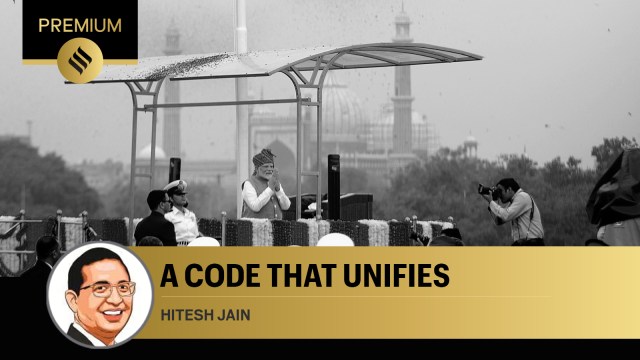
On August 15, as India celebrated its 78th Independence Day, Prime Minister Narendra Modi delivered a speech from the ramparts of the Red Fort that echoed through the nation with resounding clarity. Among the various issues he touched upon, his bold call for the implementation of a Secular Civil Code (SCC) stood out, reigniting a debate that has been lingering for decades. Vested interest groups, who have long kept the pot boiling by dividing the country along religious lines, were left in stunned disbelief. This was not merely a policy announcement; it was a clarion call for the nation to rise above divisive personal laws and to unite under a single, just and secular legal framework.
The PM’s appeal was rooted in the vision of Babasaheb Ambedkar, the principal architect of the Indian Constitution, who once said, “I measure the progress of a community by the degree of progress which women have achieved.” The SCC is a vital step towards achieving this vision, ensuring that every citizen, regardless of religion, is treated equally under the law — a true reflection of the constitutional values of justice, equality, and secularism.
The Opposition’s narrative, which portrays the SCC as a threat to religious freedom, is deeply flawed. True secularism is not about treating people differently based on their religious beliefs, it is about ensuring equality under the law for all. The SCC would apply only to civil matters — such as marriage, divorce, inheritance and adoption — leaving religious practices untouched. This measure would, in fact, strengthen secularism by eliminating outdated and divisive personal laws that have perpetuated inequality and injustice for far too long.
Furthermore, the PM emphasised that the SCC would not erode religious identities; instead, it would foster national unity by ensuring that all citizens have the same rights and responsibilities. The Opposition’s resistance, which often stems from political expediency rather than genuine concern for minority rights, is short-sighted and ultimately detrimental to national progress. An SCC is not about erasing diversity; it is about ensuring that all citizens have the same rights and responsibilities under the law.
The experience of other modern democracies that have implemented a uniform civil code demonstrates that it is possible to have a standardised legal framework without compromising religious freedom. In countries like the United States, France and Germany, citizens are governed by the same civil laws, regardless of their religious beliefs. These countries have managed to preserve their cultural diversity while ensuring equality before the law — a model that India can and should emulate. By opposing the SCC, they are not defending religious freedom but perpetuating a system that discriminates, particularly against women.
In fact, the current personal laws are not only different but also deeply discriminatory. They create a patchwork of legal standards that vary significantly from one community to another, often leading to gross injustices, especially against women. By implementing the SCC, the government would be ensuring that all women — regardless of their religion — enjoy the same rights and protections, thereby advancing social justice.
The SCC is not just about addressing inconsistencies and injustices; it is about modernising India’s legal system. The current system, with its myriad of personal laws, is outdated, cumbersome, and often confusing. It creates a situation where citizens are subject to different legal standards depending on their religion, leading to legal uncertainty and, in some cases, exploitation of legal loopholes.
For instance, the case of Sarla Mudgal v Union of India highlighted how individuals could exploit the differences in personal laws to circumvent legal restrictions. In this case, a Hindu man converted to Islam solely to marry a second time, taking advantage of the fact that Muslim personal law permits polygamy. Such situations create a mockery of the legal system and undermine the rule of law.
An SCC would streamline and simplify the legal framework, making it more accessible and understandable for the average citizen. It would ensure that all citizens are subject to the same legal standards, thereby reducing the potential for legal exploitation and ensuring that justice is applied uniformly.
Moreover, an SCC would significantly reduce the burden on India’s overworked judiciary. With nearly 4.70 crore cases pending across courts in India as of March 2022, the judiciary is struggling to keep up with the backlog. Many of these cases arise from disputes related to personal laws, which are often complex and time-consuming to resolve. By implementing an SCC, the legal system would become more efficient, freeing up judicial resources to address other pressing national issues.
Finally, it is crucial to remember that implementing an SCC is not merely a policy choice; it is a constitutional duty. Article 44 of the Indian Constitution mandates that the state shall endeavour to secure a Uniform Civil Code for all citizens. While this directive is not enforceable by law, it is fundamental in guiding the governance of the country.
As Prime Minister Modi rightly pointed out, the implementation of the SCC is not just a legal necessity; it is a moral imperative. Moving beyond outdated and divisive personal laws is essential to achieving the constitutional vision of an India where all citizens are treated equally under the law. As we move forward, let us recall the words of Babasaheb Ambedkar: “Law and order are the medicine of the body politic, and when the body politic gets sick, medicine must be administered.” The SCC is the medicine that India needs to cure the ills of inequality and injustice that have plagued our society for too long.
The writer is Managing Partner, Parinam Law Associates and Vice President, Mumbai BJP



